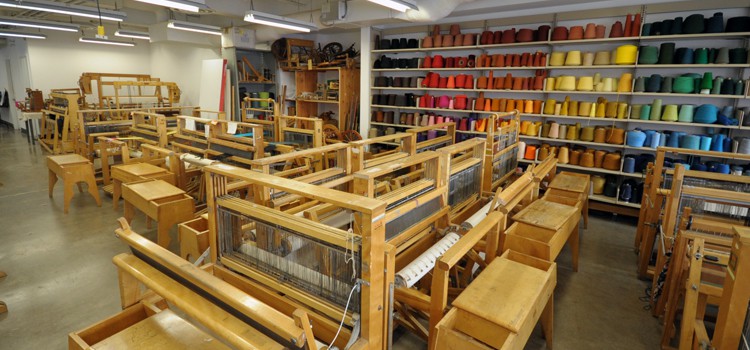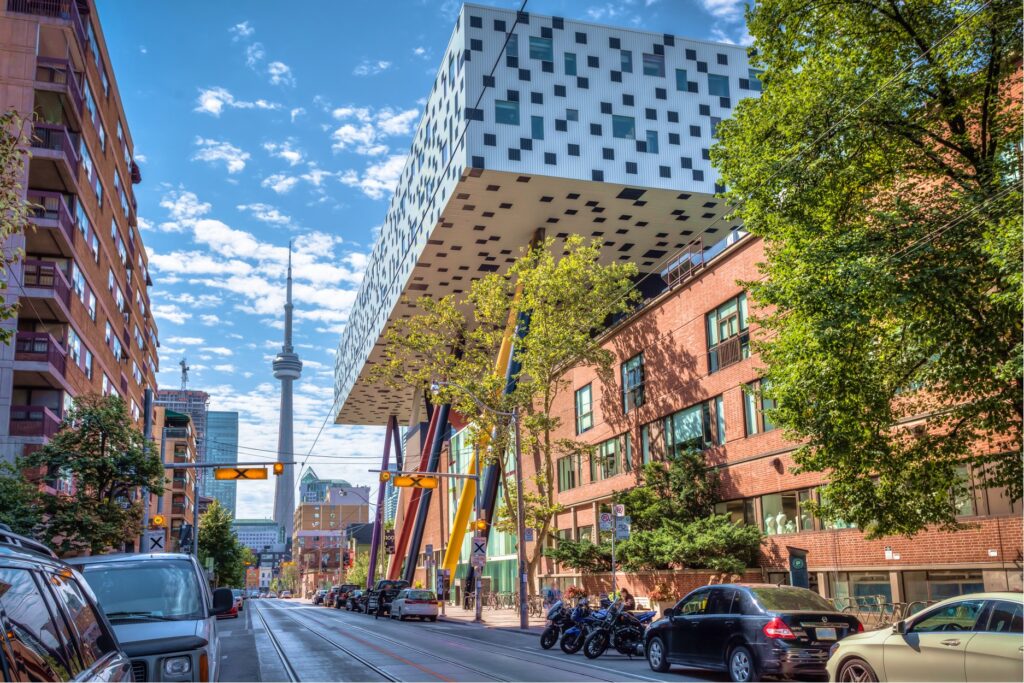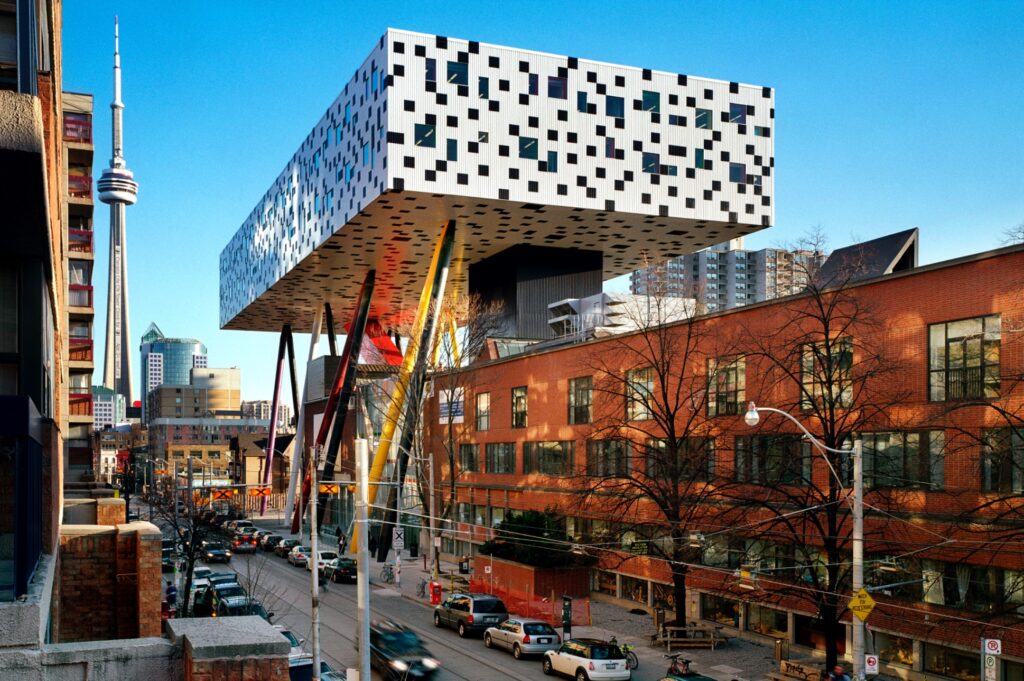ApplyBoard is proud to feature OCAD University (previously the Ontario College of Art and Design) on our platform. Their innovative art, design, and media programs have attracted students from around the world to their Toronto campus for nearly 150 years.
Get to Know OCAD University
First established in 1876 in Toronto, OCAD University (OCAD U) became a university in 2002. Over that time, it’s grown to become the third-largest of the 40 professional art and design universities in North America. Ever since its founding, when two of Canada’s Group of Seven artists worked as its first principal and vice-principal, OCAD University has encouraged artistic excellence amongst its students and faculty.
Today, OCAD University’s programs and research bridge the fields of sustainability, digital media, design, indigenous cultures, cultural diversity, and health and wellness. International students make up 30% of the student body, attracted to the combined academic rigour and hands-on, studio-access programs.
Over 19,000 OCAD U alumni are among Canada’s leading artists and designers. From city planning to curation to medical equipment construction, these alumni have left their mark and built flourishing careers.
Recent grad Anvaya S.D. (Advertising, 2022) shared:
“My work revolves around tackling and raising awareness about the challenges women face, with empathy and inclusivity guiding my creativity. I chose OCAD because I liked the human approach towards advertising. The diverse student body has helped me see things from different perspectives.”

Image Courtesy of OCAD University
Study Options
International students have access to the full range of 17 undergraduate and 7 postgraduate programs at OCAD University. Whether you’re interested in pursuing industrial design, advertising, photography, or experimental animation, OCAD U offers programs to help you hone your skills.
OCAD U currently has over 4,500 undergraduate students enrolled in its 17 programs. Plus, many students in their final year participate in the Experiential Learning Placement opportunity, which connects industry and community partners with students soon to graduate. Through the Experiential Learning Placement, students gain credits—and hands-on experience—through independent field placements or placement courses.
When asked about OCAD U’s learning environment, fourth-year Graphic Design student Emily L. shared:
“I have been focusing my study towards the digital advertisement sector, branding and UI design. OCAD U is [one of] the only places that provides specialized teaching targeting the design field I’m interested [in] and it has not disappoint[ed]. The community is also positive and encouraging, allowing individuals to express their creative style freely without being judged.”
More recent additions to OCAD U are seven graduate programs, some with multiple credentials possible (the Digital Futures program offers a Master of Arts, Master of Design, and a Master of Fine Arts).
One of OCAD University’s most unique programs is its Master of Design: Design for Health. This program “responds to the complexity of health care through a comprehensive, academically-rich design approach” and empowers students to “create ethical, sustainable solutions to pressing…challenges across the health sector.”
All programs have one intake per year in September. OCAD University has a recommended application deadline of February 1, but applications may be considered after that date if there’s space. In addition to standard application documents, many programs require students to submit a portfolio or writing sample. So, make sure you leave plenty of time to assemble one!
Because international tuition fees vary, please visit the OCAD University admissions page for current information.

Image courtesy of OCAD University
Student Housing
Although OCAD University doesn’t provide student accommodations, there’s lots of housing options in Toronto. Interested in finding a place? In May and June, OCAD U hosts virtual housing fairs to connect future students with possible homes.
OCAD University has also partnered with Places4Students.com, a platform with a real-time vacancy database for off-campus housing. Customize your search to find properties with specific features. You can also use Places4Students to look for roommates or search sublet opportunities. During spring and summer terms, OCAD U students may also use University of Toronto’s student housing services.
Some students may choose to live further from campus, while others may want to live closer to Toronto’s downtown. In any case, living near public transit is helpful. The closest subway station (St. Patrick) is a five minute walk from campus, and multiple Dundas Street streetcar stops are also nearby.
Wondering which type of student accommodation is best for you? Our guide’s got you covered.

Image Courtesy of OCAD University
Life in Toronto
OCAD University’s downtown campus positions international students in a thriving art scene, both in and out of classes. Looking for inspiration? The Art Gallery of Ontario, showcasing over 90,000 works of art, is next door, and OCAD U students may visit for free. Look a little further, and students can find 26 more public galleries and 86 commercial galleries in the city. Or stay on campus, where seven galleries display work by both students and renowned professional artists, designers, and researchers.
Toronto is a city of 2.79 million, representing 7.6% of Canada’s total population. It’s home to the third-largest community of visual artists and entertainment professionals in North America—and thanks to campus events like the Cultural Community Expo (CCE), students don’t have to build a community on their own. The CCE brings together Toronto’s art and cultural sector to prepare students for a career in the arts. Students can connect with prominent alumni, guests, studios, cultural organizations, and production centres at this event. Plus, students learn how to engage with the community through mentorship and professional development opportunities.
Like many large cities, Toronto is a city of neighbourhoods. As you travel to different parts of the city, the architecture, environment, people you see, and even the languages you hear can change. When considering where to live, research different neighbourhoods to find one that fits your budget and lifestyle. Some parts of town might feel very comfortable, where others might feel surreal, like you’ve stepped into a movie set.
…and you might do just that, someday! Popular movies like Good Will Hunting, Pacific Rim, and Suicide Squad were filmed in Toronto. Foreign producers spent US$1.12 billion on film and TV production in the GTA in 2019 alone, which is great news for international students who want to work in the entertainment industry.
As an international student in Toronto, you’ll be part of an increasingly diverse population: In 2016, Statistics Canada reported that 47% of the city’s residents identify as immigrants. This number is only growing. Whether folks came to Toronto for study, for love, for work, or for family, this city attracted them all, and many chose to stay.
Toronto is also full of beautiful green spaces, if you need a moment to recharge!

Image courtesy of OCAD University
Life After School
OCAD University offers career-related services to help graduates land meaningful jobs, set up businesses, and advance their professional practice. New graduates also keep access for one year to valuable programs like Office 365, Freshbooks, and Adobe Creative Cloud. The university’s RBC Centre for Emerging Artists & Designers (CEAD) also supports the early careers of all students and recent alumni. CEAD offers job boards, workshops, and mentorships.
International students who want to work in Canada after graduation may apply for a Post-Graduation Work Permit (PGWP). After graduation, OCAD University will share everything new grads need to know about applying for PGWP in a written communication. But, if you have questions before then, contact OCAD U International Student Services. Best of luck in your study abroad journey!
Curious if studying abroad at OCAD University is right for you? Learn more about applying.



